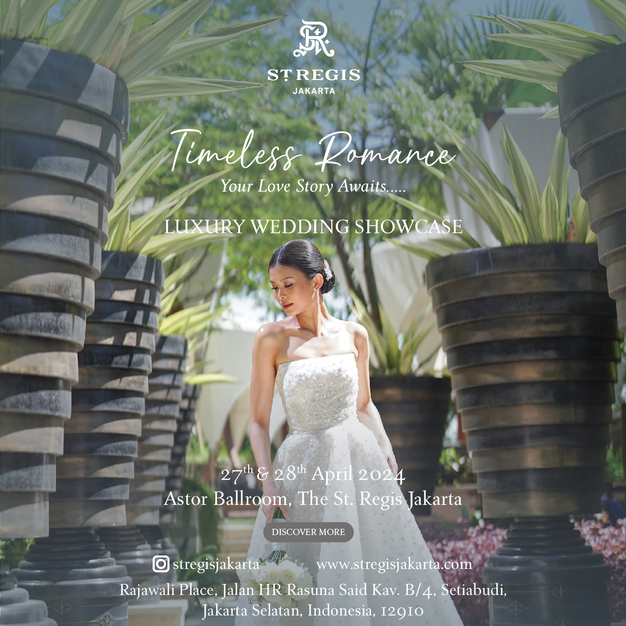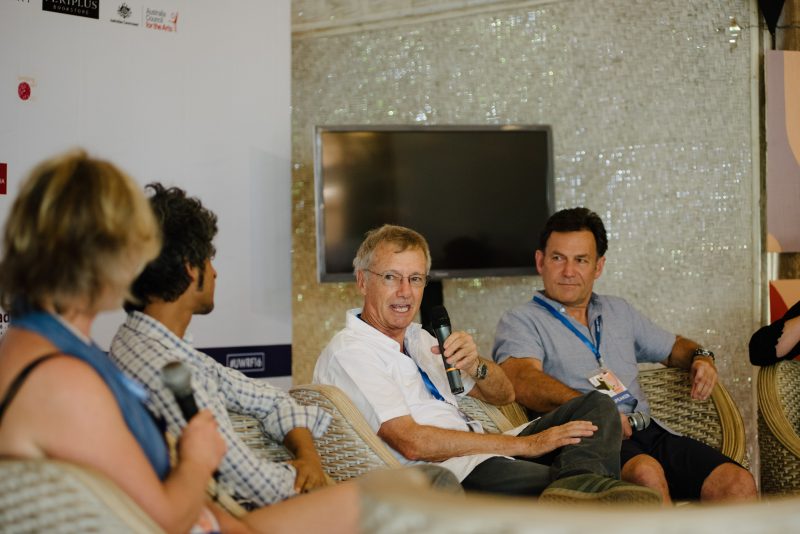Tony Wheeler set up the world’s largest travel publisher in 1973 with his wife Maureen before selling it to BBC Worldwide in 2012. At this year’s Ubud Writers’ Readers Festival (UWRF), Caranissa Djatmiko sits down with the 69-year-old man to find out what it really means to travel in the digital era.
The digital revolution has made quite an impact in the travel industry. But co-founder of Lonely Planet Tony Wheeler thinks that it has not really reoriented the way people adventure these days. During the UWRF, I had the chance to sit down with Wheeler to discover what it really means to travel to a new place. But rather than focusing on the debate on whether or not Facebook and travel blogs have revolutionized the way we experience adventures, he chose to reflect on a number of reasons why people decide to embark on a new journey to begin with.
Wheeler finds that most of his travel memories are not entirely supported by technology. Instead, for him it was the moments and mental experiences created from visiting new places that truly counted. According to him, this was all possible long before the digital era began.
What motivates you to travel?
Very often it is something about the place which just fascinates you. I mean the wackiest place I went to this year was Chernobyl and it’s like this ghost town beside the nuclear reactor. It’s quite safe now. You’re not going to get radiation poisoning going there. You know, it was one of those things that brought the Soviet Union down. It was this sort of tale of craziness and mistakes, which started as an individual mistake on the day, but later turned into a big mistake in the Soviet Union.
And then another place I’ve been to this year was the Panama Canal. It’s an interesting time to be there and then I managed to go there just when the Panama Papers scandal broke. So then there was another element to being there that made it interesting. But then I didn’t realize how it’s sort of the narrowest point between North and South America, that’s why they built the canal there. It is a meeting point, so you get all these amazing birds. I spent a day with a birdwatcher and he was pointing out, ‘Well that one’s come down south from North America, that one’s come up north from South America,’ and suddenly there was this whole other perspective to it.
It’s just that one thing that inspires the visitors. And I think that sometimes you see a photograph in a book and you go to a museum and you see something, then you think: I want to go there, I want to experience that. That one little spark, that’s the interest.
It’s interesting how the panel discussed a lot about whether or not technology dictates your travel experiences. But do you think technology is the most important part in creating memories?
You know kretek cigarettes are from Indonesia? You can be anywhere in the world but once you smell that, you immediately think Indonesia. I was at this conference in Germany and for several days I’d be walking along and suddenly something hit my mind about Indonesia or Bali. And I started to think: Why am I thinking about Bali. There turned out to be an Indonesian stand nearby and these people were smoking kretek (these were the days when people could smoke indoors). My mind thought of Indonesia before I even realized what the connection was. It’s strange, smells are very much that way. They do take you to a place that other things [like technology] don’t.
Regardless, technology somehow still contributes to the way we travel, right?
These places do get richer and bigger [with the help of tech as you travel] because they are not just a map. We touched on these things in all sorts of different ways. You spend some time there and find that they are indeed a much larger dimension [than they appear], which is good.
You are currently in the process of making books. Can you tell us a little bit about that?
I’m actually writing a book right now for the National Library of Australia about the islands there. I couldn’t believe how many islands Australia has when I started this. Australia has 8,000 islands and it’s unbelievable. This time it is not like writing a guidebook, a lot of it is just research and then I come back to the libraries because there are things you cannot find on Google. But I spent a lot of time working on Google too. It has really opened my eyes to lots of things and I really enjoyed it.
How often do you travel?
I have got two homes. I’ve got a home in England and I’ve got a home in Australia, so I travel in between these two. You know I could probably say I spend one third of the year in Australia, and one third of the year everywhere else.
What does being a traveller mean to you?
Once upon a time you used to say, ‘Oh I’m not a tourist, I’m a traveller’. There were these two different things. I think sometimes we do need to be travellers and we do need to be going outside of our comfort zones. And it’s a good thing. Sometimes you need to be surprised by things and other experiences that you wouldn’t have otherwise known.
How exactly do you define a tourist and a traveller?
In some ways you can say the days you wake up, and talk about this in this panel, but you don’t know where you’re going to be staying. You’re confident that you’re just going to find a place, wherever you might end up. And that’s a real travel experience, not knowing where you’re going to turn. You can be a tourist and not know where you’re going, but still have an attitude about, and interest in, what you experience. That makes you more of a traveller.
I don’t think it necessarily has anything to do with money. Particularly for young people, it is important to travel poor. Because travelling without money pushes you to walk more or take the local bus more. It gives you more experience. Sometimes you find people who go straight to the hostel because it is comfortable, but they end up only talking to the same people. So it isn’t necessarily being short of money that makes you more of a traveller, but it is a factor in the equation.
This transcript has been condensed and edited.
Featured Image via Wirasathya Darmaja




